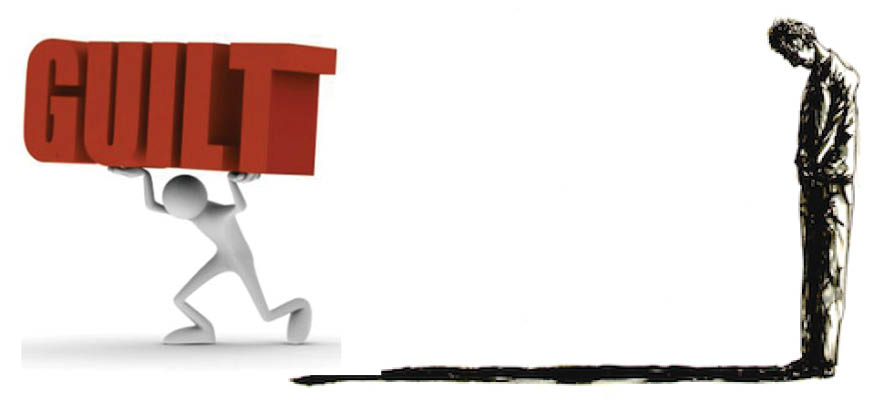.
Do you sometimes feel like you’re jet-lagged from all the guilt trips you take?
Are you exhausted from carrying around a large bag of “I should have”, “I could have” or “Why didn’t I?”
Guilt is anger turned inward. And being its recipient can gradually wear you down, sometimes leading to self-harm, depression and many other disorders.
Guilt shows up in many ways. It stems from your belief that you could have done ‘better’, no matter what the situation. ‘Better’, too, is a dodgy concept. How do you know, that had you had done things differently, it would have worked out in the way you would have liked?
Take Zohaan’s story. He married Rati, an older divorcee, who is also the love of his life. Just before the wedding, his father cut him off and refused to ever see them – him or Rati, again. The youngest of three, Zohaan was heartbroken and soon their marriage started witnessing violent fights. Their marriage became unsteady and they began to consider divorce.
In just a few counselling sessions, Zohaan faced his own guilt at ‘leaving’ his family. The anger he felt at himself was redirected to his wife. The truth is that he loves his wife and wants to be with her. But he wants to be with his family too. In therapy, he agreed to write a letter to his father. While he had been given the choice to send it or not, a little time after writing it, he decided to deliver it to his dad. It helped. He and his father are trying to rebuild their relationship, and he finds himself being kinder to Rati.
So, Is Guilt Normal?
Some amount of guilt is normal. People don’t act perfectly all the time and it’s natural to feel that you could have done something differently. However, guilt can begin to affect your life to the extent that it inhibits you from functioning normally. It can manifest itself in blame – of yourself as well as your environment and other people. It can lead you into thinking only of your regrets and into criticizing yourself relentlessly… making your life unhappy and hard to live.
When Should I Ask For Help?
Look for the following symptoms – and then decide:
- You can’t seem to truly enjoy anything without feeling guilty.
- You blame yourself for everything that goes wrong, even indirectly. You can’t stop beating yourself up.
- You worry constantly about your loved ones and believe that you can protect them with your actions.
- You become a master at self-sabotage.
- You minimise your accomplishments and find it hard to accept praise or compliments.
If you are able to related with one of many of the above symptoms, for a good period of time, then it would be a good idea to seek help from a professional to help you unburden your guilt and disallow it from taking over your life, leading to self-despair and ruining your relationships.
How Can Counselling Help?
Counselling will first help you identify if you are feeling guilt, and then, zero in on the context that is causing your guilt. It also exposes the belief that makes you feel guilt in the first place, and thus helps you resolve it…
Take the case of Heera, an artist who never exhibited her work but longed to make a living doing what she loved. Heera always had a reason why she couldn’t complete a canvas or charge an appropriate amount. She was diligent with therapy though, coming every week. Within a few months she was able to make the breakthrough and was able to see that she sabotaged herself because she believed she didn’t deserve to be successful. This was the consequence of the fact that her mother had never had a chance to work and earn her own money, as she had to take care of the children, her included. When she accepted that her mother had made her own choices, she was able to let go of her guilt and held an exhibition after a year of dedicated work.
The truth is, we don’t know what the outcome of our actions can be. And if we had the facility to act differently at a particular time, we would. By beating ourselves up, we discount the fact that at the time of behaving the way we did, we were surrounded by factors we couldn’t change, like the situation prevailing then, or the people who were with us then, or most importantly, our emotions at the time.
Remember, the person who feels the guilt, is not the same person who committed the act. All the circumstances are different now. And recognising that, is granting yourself a special kind of freedom to enjoy all the blessings you have been given.
(Names in Case studies have been changed to protect identity.)
- What’s The Big Deal About Body Image Issues? - 3 August2019
- Is There Something Wrong With Feeling Guilty? - 13 July2019
- Am I Being Abused? - 22 June2019
